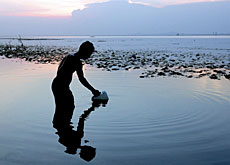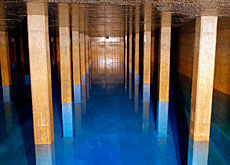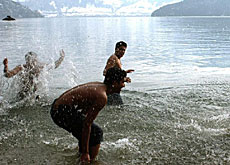NGOs demand treaty to ensure right to water

Swiss non-governmental organisations have called for an international treaty to protect water as a universal public good.
Alliance Sud, a group of six leading Swiss development organisations, issued the demand at a public forum ahead of Thursday’s United Nations World Water Day.
The forum in Bern “Access to water – a human right” brought together development and human rights experts as well as people from the business world.
“We are convinced that water needs the protection of international law, like climate or biodiversity [are protected by] treaties,” Rosmarie Bär, who is responsible for water issues at Alliance Sud, told swissinfo.
“An international water convention would give people an important instrument to demand the right to water at the national and local level, and allow them to become democratically involved in water policy decisions,” she added.
A treaty could be adopted in autumn 2008, but it would still take a number of years to be ratified.
For Wolfgang Amadeus Brüllhart, head of human rights policy at the foreign ministry who also took part in the debate, access to water is implicitly recognised as a human right; the main point is how this can be realised in practice.
“At the multilateral level, Switzerland limits itself to supporting relevant international resolutions and declarations,” explained Brüllhart.
To improve access to clean drinking water and proper sanitation, the ministry also advocates in its guidelines closer cooperation with private industry and local authorities.
But attracting big business is heavily criticised by NGOs.
“The private sector has a role, but it shouldn’t own water. Water is a public good and shouldn’t belong to a private monopoly,” said Bär. “Access to water is a human right and states are responsible for the respect of human rights.”
Maude Barlow, co-founder of “Blue Planet Project” which fights for equal access to water, was equally forthright: “The mineral water lobby are not the only ones to profit from the crisis – a global water cartel also exists.”
Swiss protection
The theme of this year’s UN-sponsored World Water Day is “coping with water scarcity”.
Water scarcity may conjure up images of drought, the organisers point out, but across the globe agriculture, urbanisation and industrialisation, as well as global warming are exerting huge pressure on water supplies. The lack of water is primarily linked to wastage and pollution.
In Switzerland water quality is generally good to excellent and over the past 50 years it has been significantly improved thanks to the construction of wastewater treatment facilities.
But according to the Federal Environment Office, Switzerland still faces a number of water protection challenges, in particular those linked to pollution from micropollutants.
“Chemical products in detergents, toothpastes, medicines, coatings and pesticides originating from households, industry and agriculture all end up in the water,” said Stephan Müller, head of the water division. “Despite low concentrations, they can still be harmful.”
Hormonal substances are the most problematic, explained Müller, as they can affect fish reproducing.
A national research programme is currently looking into this problem and the environment office has launched a project to develop equipment at selected wastewater treatment facilities to combat micropollutants.
“The effects of micropollutants are not totally clear as the processes are very slow. These products first concern a few animals, then the whole population, before affecting a whole ecosystem,” explained Müller.
“In the long run they could prove to be very dangerous and toxic, and there would be no way of reversing the effects.”
swissinfo, Simon Bradley
The United Nations General Assembly adopted a resolution in 1992 making March 22 World Day for Water.
Countries were invited to devote the day to promoting public awareness by organising events and publications related to the conservation and development of water resources.
The theme of this year’s day is “Coping with water scarcity”. The UN agency in charge is the Food and Agriculture Organization (FAO).
On Wednesday the Swiss branch of the World Wildlife Fund (WWF) launched a competition to find new ways of revitalizing Swiss rivers and streams. Some SFr200,000 in prize money is on offer for the best ideas.
Three-quarters of the planet is covered by water, but only a small fraction is available as freshwater. Of that, nearly 70% is used for food production – up to 95% in some developing countries.
Shortly before handing over the reins, former UN Secretary-General Kofi Annan described the global water crisis as “the biggest challenge for the international community”.
According to the UN, more than one in six people worldwide – 1.1 billion – do not have daily access to 20-50 litres of safe freshwater – the minimum a person needs for drinking, cooking and cleaning purposes.
Two out of every five people lack proper sanitation facilities. Every year 1.8 million children die from diseases linked to unsafe drinking water.
According to the UN Development Programme, it would cost only $10 billion per year to attain the UN Millennium Development Goal of halving the number of people who have no access to safe water by 2015 – less than five days’ global military spending.

In compliance with the JTI standards
More: SWI swissinfo.ch certified by the Journalism Trust Initiative












You can find an overview of ongoing debates with our journalists here . Please join us!
If you want to start a conversation about a topic raised in this article or want to report factual errors, email us at english@swissinfo.ch.